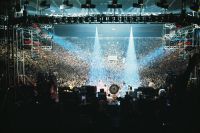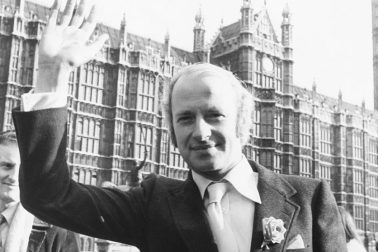In its 6 October 2007 edition, The Spectator reported on Israel’s air-strike on Syria exactly a month before. We noted that the 6 September raid ‘may have saved the world from a devastating threat’ and revealed that a senior British ministerial source had told us that: ‘If people had known how close we came to world war three that day there’d have been mass panic.’
The article provoked scepticism in certain quarters. In the New Yorker, Seymour Hersh, the veteran American journalist, sneered that our coverage was ‘overheated’. But information declassified by the Bush administration last week — under pressure from Congress, it should be stressed — suggests that it is Hersh’s temperature controls, rather than The Spectator’s, which need adjusting.
In a briefing to Congress badgered out of the administration after seven months of evasion, the CIA — basing its conclusions on video, satellite images and other visual evidence — said that what the Israelis had hit was a plutonium-producing reactor that the Syrians had been building with North Korean expertise. To be clear, this means that North Korea was — and probably still is — happy to share its nuclear knowledge with other rogue states.
Some still refuse to believe the evidence presented. To them, the denials from Damascus carry more weight than the briefings from Washington. After the debacle of Iraq, the British dossiers and Colin Powell’s notorious briefing to the UN Security Council, it is understandable that there is public scepticism about the reliability of Western intelligence. But it is dangerous when scepticism conspires with wishful thinking: and it is wishful thinking to imagine that, because the threat of WMD in Iraq was exaggerated, no such threat can exist anywhere else.
The geopolitical context is, in any case, very different. In the case of Iraq, the intelligence served the Bush administration’s strategic and political purpose: regime change in Baghdad. In the Syrian case, the remaining objectives of the administration are jeopardised by this disclosure. The White House is eager — recklessly eager, indeed — to cut a deal with North Korea and the revelation that Pyongyang has been engaged in apparent open-market proliferation makes that task appreciably harder.
US officials also revealed that they did not know about the reactor until the Israelis informed them about it. The Americans have been frantically searching Iraq for WMD for five years, and have 100,000 troops in the country, along with all manner of intelligence assets. Yet it now seems that a nuclear reactor was being built only 90 miles over the border, near the village of At Tibnah in the Dayr az Zawr region — and the US didn’t know about it until somebody else tipped them off. This embarrassing disclosure will only encourage those nations and terrorist groups which want to pursue covert WMD programmes.
The most worrying conclusion to be drawn from this episode, however, is that America remains fundamentally impotent in the face of North Korea’s nuclear proliferation. The Syrian reactor may have been destroyed, but North Korea has faced no additional sanctions or penalties for the criminal activities that led to its initial construction. This is proof, yet again, that once a state has gone nuclear the international community cannot truly hold it to account for its actions. This remains the soundest argument for the much-derided doctrine of pre-emption: once a state acquires nuclear capacity, it is axiomatically too late to do much about it.
This brings us to the subject that dare not speak its name in British politics: Iran. Contrary to what may have been suggested by the US National Intelligence Estimate late last year — an example of politicised intelligence if ever there was one — Tehran has not abandoned its nuclear ambitions. At some point further down the line, if sanctions and other such options do not work, military action may yet have to be contemplated.
Only a fool would disregard the terrible consequences of a military strike against Iran’s nuclear facilities. Such a mission should not even be considered except as a matter of absolute last resort. Equally, however, only a fool would disregard the consequences of allowing Iran to go nuclear. As North Korea’s co-operation with Syria demonstrates, once a state has nuclear weapons it has a terrifying degree of freedom on the international stage. How would the West stop a nuclear Iran from stepping up its support for the terrorists of Hamas and Hezbollah, or attempting forcibly to expand its influence in the Gulf? The war on terror — or whatever you wish to call it — and the perils posed by rogue states and WMD will not go away when George W. Bush leaves office. North Korea will not be inspired to disarm by (say) Barack Obama’s inaugural address; nor will the Iranians suddenly decide to abandon their decades-long attempt to develop a nuclear capability. Al-Qa’eda and those who have absorbed its murderous ideology will continue to seek access to the world’s deadliest weapon. These problems will be with us for much longer than any commander-in-chief.
The errors of Iraq do not make such matters any less urgent. It is still imperative that the West prevents WMD from falling into the hands of terrorists who, by their very nature, are immune to the old-fashioned logic of deterrence. The most effective way to do this is to prevent rogue states — or to be more precise, any more rogue states — from reaching nuclear status. We already know that North Korea is prepared to sell to the highest bidder, while Iran actively supplies terrorist groups with its existing weapons as a matter of policy.
This is the context in which Israel’s actions last September should be seen. The raid nipped one such programme of co-operation in the bud — but there will be others, and they too will have to be confronted. The bitter legacy of Iraq and the sour taste of Bush’s final months have encouraged the international community to evade these unpleasant realities. How convenient it would be if the triple forces of WMD, global terror and rogue states disappeared in a puff of smoke in January when President Bush leaves office. Yet only the most ‘overheated’ imagination could believe in such a fantasy.





Comments